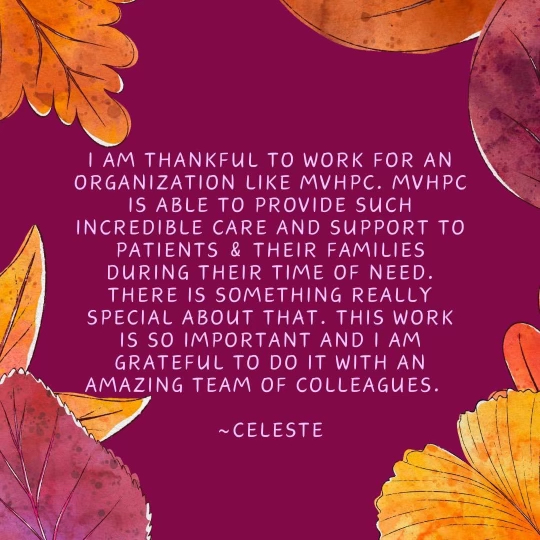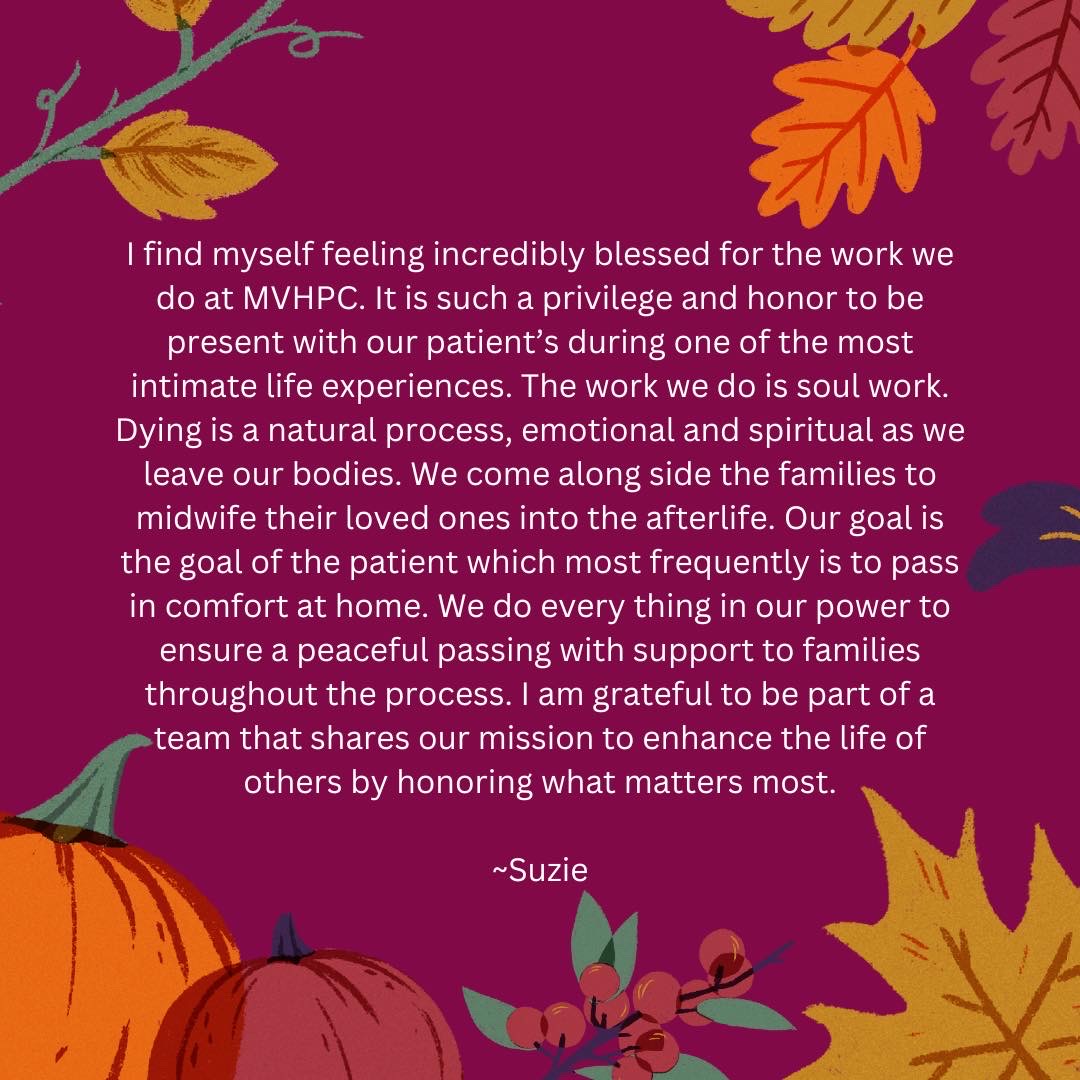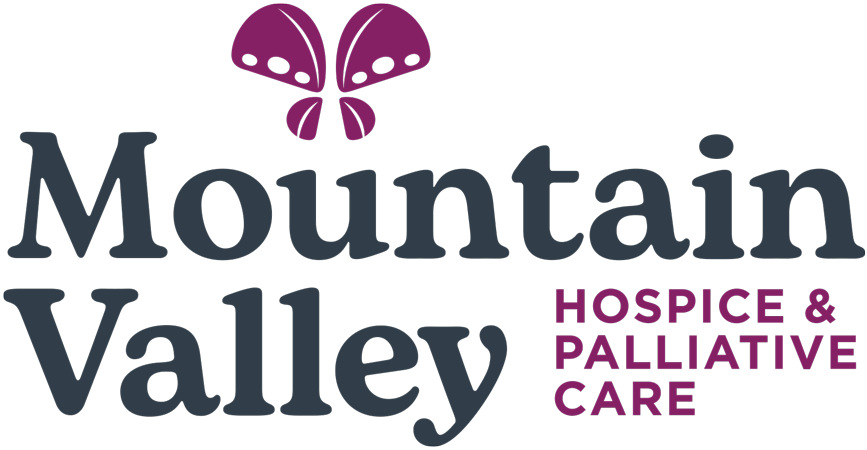Learn About MVHPC
What is Hospice Care?
The term hospice refers to an approach to end-of-life care as well as to a type of facility for supportive care of terminally ill patients. Hospice programs provide palliative (care that relieves discomfort but does not improve the patient’s condition or cure the disease), patient-centered care, and other services. The goal of hospice care, whether delivered in the patient’s home or in a healthcare facility, is the provision of humane and compassionate medical, emotional, and spiritual care to the dying.
Mountain Valley Hospice is now Mountain Valley Hospice & Palliative Care. We have expanded services to offer the best of both worlds! Not ready for Hospice yet? Continue aggressive, curative treatment or experimental drug regimens while still receiving support from our clinical team in your home.
- Do you have symptoms you struggle to manage?
- Is your quality of life suffering?
- Do you see multiple doctors from different specialties?
- Are you taking multiple medications that are overwhelming to track and manage?
- Have you been to the Emergency Room more than once within a year?
- Have you been admitted to the hospital for a “flare up” of one of your conditions?
Let the Mountain Valley Palliative Care team coordinate these complicated pieces of your care for you. We will personalize your care plan to meet your lifestyle goals and reduce Emergency Room or Hospital visits.
Our nurses and doctors will make your wellness their priority as they collaborate with you to manage your chronic illnesses.
From emotional support to identifying additional community resources, the Mountain Valley team is available 24/7 to alleviate your worries and remove uncertainty.
Call us to share your personal story. Allow us to join your journey to share your burden.
We are still Mountain Valley. And we remain honored to serve you in your home or ours.
What is Palliative Care?
- Palliative Care is a collaboration between our team of doctors, nurse practitioners, registered nurses, and social workers with your community physician(s) to alleviate symptoms and manage pain related to chronic illness.
- We visit you in your home and provide advice on improving quality of life, coordinating all facets of your care with the rest of your doctors.
- We share any suggestions for changes in medication with your Primary Care or Specialty physician.
- If you are in need of additional community resources – from durable medical equipment to transportation to counseling – our Care Navigator will assist in connecting you with various agencies or options within your geographic region.
- If you had a recent Emergency Room visit or Hospital stay, our team can bridge the gap in care between your return home and your follow-up appointments. New medications and a new diagnosis or recovery process can be overwhelming without medical expertise and support.
- Proper Advanced Care Planning takes time and trust. We can help you and your family make long-term decisions that reflect your values and preferences.
What is the difference between Hospice & Palliative Care?
- While Hospice requires a prognosis of 6 months or less, Palliative Care does not have any limitations for length or duration of illness. It’s meant to assist chronically ill or complexly ill patients who are not necessarily at the end of their life.
- When a patient chooses the Hospice benefit, he/she must stop curative treatments, including experimental drug regimens. Palliative patients get the best of both care models in that our interdisciplinary clinical team follows them in their home, while still able to pursue aggressive treatment and/or drug regimens.
- Hospice allows for expanded services like a Volunteer to assist with running errands or sit with the patient while family go to appointments. Hospice also offers a periodic Respite Stay at the Nancy Dowd Hospice Home to allow caregivers a chance to rest and recharge.
- Palliative Care usually involves a nurse visit every 30 days, while Hospice provides a nurse visit every 14 days maximum.
- Palliative Care patients call 9-1-1 if there is a medical emergency. Hospice patients call the MVHPC team to assess the medical emergency and rarely call 9-1-1.
- Both services allow 24/7 phone access to the MVHPC care team.
How do I pay for Palliative Care?
- Palliative Care is a growing medical specialty that is covered by Medicare Part B and some health insurance companies.
- For those who do not have insurance or do not have an insurance company currently participating in Palliative Care, MVHPC offers a menu of private pay pricing based on a variety of service and visit options.
- We are happy to answer specific payment-related questions at 518-725-4545.
- Because Palliative Care is an evolving piece of the care continuum, it is very difficult to generate revenue to cover the cost of expenses. As a small non-profit, MVHPC struggles daily to balance the budget while providing high quality care and competitive salaries to retain the most talented staff. In 2022, Ed & Susan Grover generously sponsored a portion of MVHPC’s Palliative program. We are incredibly grateful for their generosity!
- If you are interested in contributing a financial gift to ensure the longevity of this fragile resource that provides such crucial support to patients & families, please contact us at 518-725-4545.
Honored to serve you in our home or yours.


Mission – Enhancing the lives of those we serve by honoring what matters most to them.
Vision – To be everyone’s first thought for those in need of comfort, compassion, dignity, and quality of life.
Values – Teamwork, Integrity/Accountability, Empathy, Service
The TIES that bind us together…
